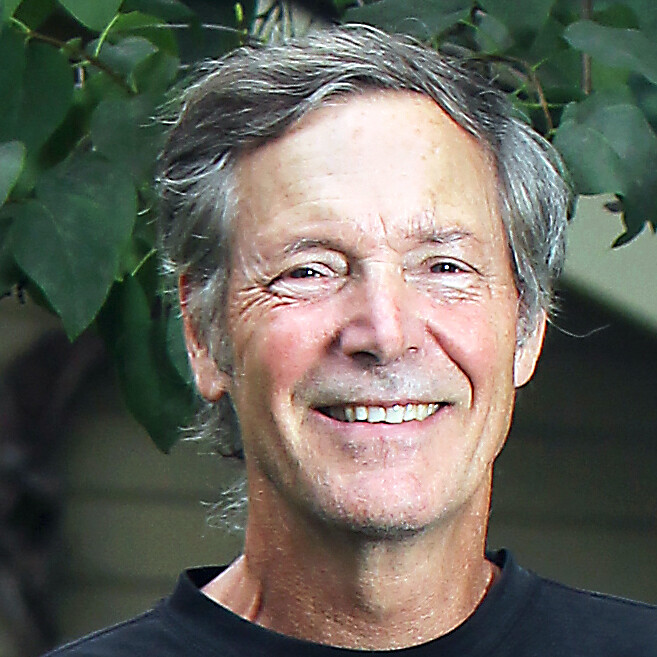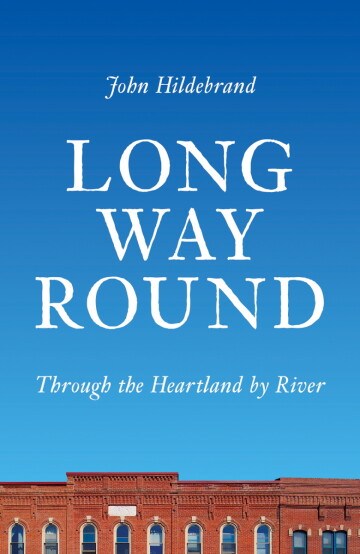Floating Around the State: Author John Hildebrand reconnects with Wisconsin by canoe

For decades the Chippewa Valley turned its back on its rivers, but all of a sudden our waterways are rising in our esteem again. From river views incorporated into the plans of new building projects to trepidatious tubers dipping their toes back in the water, the Eau Claire and Chippewa rivers feel less foreign to the general population than they have in generations. They can still be dangerous, and they still smell a little like fish, but so far, most everyone seems to welcome the reacquaintance.
“The first thing I learned on my trip is that the divides – between rural and urban, small town and big city – do exist, and it’s foolish to ignore them.” –John Hildebrand
Few have been more willing to embrace this resurgence than local author John Hildebrand. The journey he took in 2016, which became the subject of his most recent book, Long Way Round (University of Wisconsin Press), will come as no surprise to the students he’s taught over the years as an English professor at UW-Eau Claire, or to the readers of his other travel and experiential nonfiction books. At the beginning of the summer he set off to construct his own Round River, a mythical concept of a waterway that flows in a circle to deliver travelers back where they started. Hildebrand’s path wasn’t quite so perfectly circuitous, or so simple. He set off down the Chippewa River, joined the Mississippi River, then turned up the Wisconsin River, over to the Fox River. After a brief foray to the Bad River and its Gogebic mining controversy that year, he headed down the Bois Brule, to the St. Croix, then Mississippi, Chippewa, and back home. Eight hundred miles in a 17-foot square stern canoe with a six-horse outboard motor. Most nights, he pitched his tent on sandbars and awoke with the sunrise. Surely our more outdoor-minded forebearers would have been proud.
“The rivers were our original highways,” Hildebrand points out, which is an idea that has largely been lost in the age of the interstate. One of the most significant threads Hildebrand weaves into Long Way Round is the history surrounding the rivers, starting with native peoples, carrying through the establishment of towns and cities in the 19th century, and into the taming of the rivers through Depression-era lock and dam projects in the first half of the 20th century. The ghosts of the past love to gather on the banks of rivers in Wisconsin, where little development has taken place since the golden age of river travel, and Hildebrand takes care to tell the stories of all those he paddled (and motored) past.
Long Way Round, however, accomplishes much more than travelogue and history lesson. “The challenge of writing a book like this is you never know who you’re going to meet and what stories will arise,” says Hildebrand. Call it serendipity, or Hildebrand’s shrewd timing, but the summer of 2016 also found the state of Wisconsin wrapped up in a presidential election that featured its controversial governor as a candidate. Seeds that had been sown during 2010’s Act 10 controversy had sprouted into a tense political climate unlike the state had seen in quite some time. “The first thing I learned on my trip is that the divides – between rural and urban, small town and big city – do exist, and it’s foolish to ignore them.” Throughout the summer, Hildebrand met people of all political persuasions, sitting beside him in restaurants, racing past him in giant speedboats, and offering him assistance (and socket wrenches) when he needed them most. In writing about these encounters, Hildebrand questions his own biases and perceptions and gains a bit of what will help heal our political wounds better than anything else: some understanding of how other people live.
 Western Wisconsinites are taking notice of the natural features that make this place unique, like the rivers, in ways they haven’t before, even if most of our connections are confined to bridge and riverwalk vistas. But after spending more time with our rivers than most of us ever will, Hildebrand is quick to explain, “What makes a place special isn’t scenery. It’s how that place makes you feel like part of a story.” Long Way Round captures this idea perfectly as it tells some of the oldest stories in Wisconsin, alongside those that are playing out in the headlines and small towns that dot the landscape. From the stern of a canoe, with tiller in hand, Hildebrand paints a picture of our state that feels both nostalgic and fresh, and acknowledges that, whatever challenges we’re working to overcome, our rivers will keep flowing on.
Western Wisconsinites are taking notice of the natural features that make this place unique, like the rivers, in ways they haven’t before, even if most of our connections are confined to bridge and riverwalk vistas. But after spending more time with our rivers than most of us ever will, Hildebrand is quick to explain, “What makes a place special isn’t scenery. It’s how that place makes you feel like part of a story.” Long Way Round captures this idea perfectly as it tells some of the oldest stories in Wisconsin, alongside those that are playing out in the headlines and small towns that dot the landscape. From the stern of a canoe, with tiller in hand, Hildebrand paints a picture of our state that feels both nostalgic and fresh, and acknowledges that, whatever challenges we’re working to overcome, our rivers will keep flowing on.
John Hildebrand will debut his new book, Long Way Round, at the Chippewa Valley Book Festival with a sold-out Oct. 22 event at the Pablo Center at the Confluence.






















